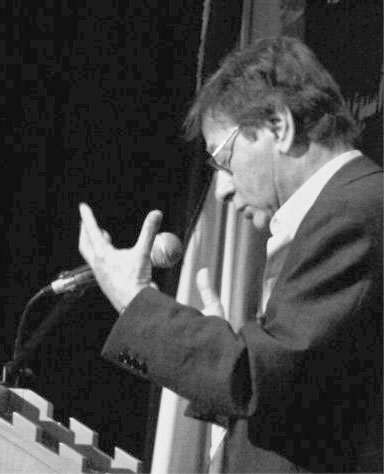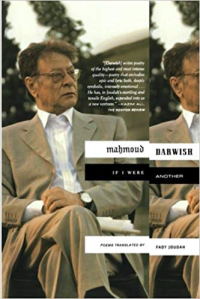A Lover from Palestine, poem by Mahmoud Darwish

“I have learned and dismantled all the words in order to draw from them a
single word: Home.” Unfortunately, It Was Paradise: Selected Poems
Your eyes are a thorn in my heart
Inflicting pain, yet I cherish that thorn
And shield it from the wind.
I sheathe it in my flesh, I sheathe it, protecting it from night and agony,
And its wound lights the lanterns,
Its tomorrow makes my present
Dearer to me than my soul.
And soon I forget, as eye meets eye,
That once, behind the doors, there were two of us.
Your words were a song
And I tried to sing, too,
But agony encircled the lips of spring.
And like the swallow, your words took wing,
The door of our home and the autumnal threshold migrated,
To follow you wherever led by longing
Our mirrors were shattered,
And sorrow was multiplied a thousand fold.
And we gathered the splinters of sound,
Mastering only the elegy of our homeland!
Together were will plant it in the heart of a lyre,
And on the rooftops of our tragedy we’ll play it
To mutilated moons and to stones.
But I have forgotten, you of the unknown voice:
Was it your departure that rushed the lyre or was it my silence?
Yesterday I saw you in the port,
A long voyager without provisions,
Like an orphan I ran to you,
Asking the wisdom of our forefathers:
How can the ever-verdant orange grove be dragged
To prison, to exile, to a port,
And despite all her travels,
Despite the scent of salt and longing,
Remain evergreen?
I write in my diary:
I love oranges and hate the port
And I write further:
On the dock
I stood, and saw the world through Witter’s eyes
Only the orange peel is ours, and behind me lay the desert.
In the briar-covered mountains I saw you,
A shepherdess without sheep,
Pursued among the ruins.
You were my garden, and I a stranger,
Knocking at the door, my heart,
For upon my heart stand firm
The door and windows, the cement and stones.
I have seen you in casks of water, in granaries,
Broken, I have seen you a maid in night clubs,
I have seen you in the gleam of tears and in wounds.
You are the other lung in my chest;
You are the sound on my lips;
You are water; you are fire.
I saw you at the mouth of the cave, at the cavern,
Hanging your orphans’ rags on the wash line.
In the stoves, in the streets I have seen you.
In the barns and in the sun’s blood.
In the songs of the orphaned and the wretched I have seen you.
I have seen you in the salt of the sea and in the sand.
Yours was the beauty of the earth, of children and of Arabian jasmine.
And I have vowed
To fashion from my eyelashes a kerchief,
And upon it to embroider verses for your eyes,
And a name, when watered by a heart that dissolves in chanting,
Will make the sylvan arbours grow.
I shall write a phrase more precious than honey and kisses:
‘Palestinian she was and still is’.
On a night of storms, I opened the door and the window
To see the hardened moon of our nights.
I said to the night: Run out,
Beyond the darkness and the wall;
I have a promise to keep with words and light.
You are my virgin garden
As long as our songs
Are swords when we draw them.
And you are as faithful as grain
So long as our songs
Keep alive the fertile soil when we plant them.
You are like a palm tree in the mind:
Neither storm nor woodsman’s ax can fell it.
Its braids uncut
By the beasts of desert and forest
But I am the exiled one behind wall and door,
Shelter me in the warmth of your gaze.
Take me, wherever you are,
Take me, however you are.
To be restored to the warmth of face and body,
To the light of heart and eye,
To the salt of bread and song,
To the taste of earth and homeland.
Shelter me in the warmth of your gaze,
Take me, a panel of almond wood, in the cottage of sorrows,
Take me, a verse from the book of my tragedy,
Take me, a plaything or a stone from the house,
So that our next generation may recall
The path of return to our home.
Her eyes and the tattoo on her hands are Palestinian,
Her name, Palestinian,
Her dreams, and sorrow, Palestinian,
Her Kerchief, her feet and body, Palestinian,
Her words and her silence, Palestinian,
Her voice, Palestinian,
Her birth and her death, Palestinian,
I have carried you in my old notebooks
As the fire of my verses,
The sustenance for my journeys.
In your name, my voice rang in the valleys:
I have seen Byzantium’s horses
Even though the battle be different.
Beware, oh beware
The lightning struck by my song in the granite.
I am the flower of youth and the knight of knights!
I am the smasher of idols.
I plant the Levantine borders
With poems that set eagles free.
And in your name I have shouted at the enemy:
Worms, feed on my flesh if ever I slumber,
For the eggs of ants cannot hatch eagles,
And the shell of the adder’s egg
Holds but a snake!
I have seen Byzantium’s horses,
And before it all, I know
That I am the flower of youth and the knight of knights!
© Mahmoud Darwish estate; sorry I don’t know to whom I should credit the translation; photo credit, Mahmoud Darwish at university of Betlehem courtesy of CC BY-SA 3.0
 Mahmoud Darwish (Arabic: محمود درويش, translit. maḥmūd darwīsh, 13 March 1941 – 9 August 2008) was a Palestinian poet and author who was regarded as the Palestinian national poet. He won numerous awards for his works. Darwish used Palestine as a metaphor for the loss of Eden, birth and resurrection, and the anguish of dispossession and exile.He has been described as incarnating and reflecting “the tradition of the political poet in Islam, the man of action whose action is poetry.” He also served as an editor for several literary magazines in Israel. MORE [Wikipedia]
Mahmoud Darwish (Arabic: محمود درويش, translit. maḥmūd darwīsh, 13 March 1941 – 9 August 2008) was a Palestinian poet and author who was regarded as the Palestinian national poet. He won numerous awards for his works. Darwish used Palestine as a metaphor for the loss of Eden, birth and resurrection, and the anguish of dispossession and exile.He has been described as incarnating and reflecting “the tradition of the political poet in Islam, the man of action whose action is poetry.” He also served as an editor for several literary magazines in Israel. MORE [Wikipedia]
RELATED:
- Mahmoud Darwish, Poetry Foundation
- Mahmoud Darwish, Amazon Page


